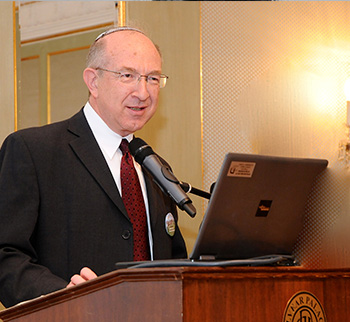An old Jewish blessing states, “You should live for 120 years,” – and Herzog Hospital in Jerusalem is doing just that.
This year, Israel’s oldest hospital is celebrating its 120th birthday.
Herzog is Israel’s foremost centre for geriatric and mental health care, treatment and research, and it’s committed to improving the quality of life for people suffering the effects of aging, neurological disorders, mental illness, respiratory ailments and psychological trauma.
“Herzog was established in 1894 on Rosh Chodesh Tevet, the fifth or sixth night of Chanukah. If we use the Hebrew date, Herzog’s official birthday will fall in the middle of December this year – when the fifth or sixth candle will be lit during Chanukah,” Dr. Yehezkel Caine, director general and CEO of Herzog Hospital, told The CJN from Montreal during a recent trip to Canada on hospital business.
Herzog has strong Canadian connections.
In 1977, a small group of people, impressed by what they saw at Herzog during a visit to Israel, decided to establish the Canadian Friends of Herzog Hospital, to bring Herzog’s activities to the attention of Canadians.
“We are pleased to continue to do this, to support the outstanding work of the hospital, in the fields of both treatment and research,” said Wendy Switzer Myles, current chair of Canadian Friends of Herzog Hospital.
In addition, Herzog’s Temmy and Albert Latner Israel Centre for the Treatment of Psychotrauma was founded in 1989 by experts in the field of traumatic stress to promote the development of services and treatment for trauma survivors throughout Israel. The centre was endowed by Toronto resident Albert Latner.
It has developed a program to help children deal with psychological trauma and build resilience. Individuals can phone a hotline or come to a free walk-in clinic.
“Trauma is something that, if it is treated early, can often be abated. If it’s delayed or not treated it becomes ingrained and almost impossible to eradicate,” Caine said.
Herzog has developed an additional specialization in the field of respiratory care for all ages, including a children’s respiratory unit. Congenital defects, genetic diseases or trauma caused by accidents or malice – such as falls, drowning, car accidents or terror accidents – can cause such severe injuries that a child requires the continued support of a respirator to breathe. The unit treats children from three months to 18 years, from all walks of life and denominations.
“Our children’s respiratory unit is the largest in Israel, and we are the only centre of this type in Jerusalem,” Caine said.
As part of its 120th anniversary celebrations, the hospital will be expanding. With its new wing, to be known as the Samson Medical Pavilion, it’s adding 270 beds to its existing 330.
“The population of Israel is both aging and growing. The need and demand for beds – especially in geriatrics – is exploding rapidly,” Caine said.
Another major feature of the new construction is an underground hospital. To be built beneath the new building into a mountainside and used during emergencies, this facility, when complete, will house an additional 300 beds.
The Samson Medical Pavilion will open in early 2015.
“This is cause for celebration. We will host a scientific symposium which will focus on brain discoveries and aging,” Caine said. “One of the most important things we doctors can do is to help care for the elderly. The care for the elderly is going to be the largest single drain on the economics of medicine in the next few decades as the population ages – not just in Israel, but the world over.”
